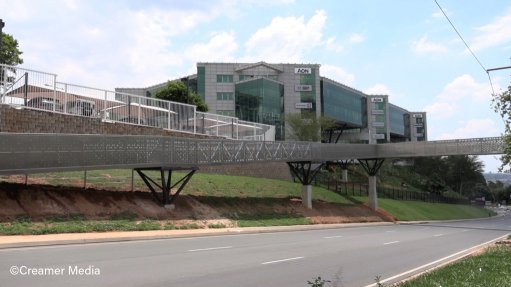Columbus Stainless Calls for Holistic Government Approach to Safeguard Domestic Steel Production
This article has been supplied.
Amidst global and local steel oversupply, nations such as the USA, as well as those in South America and Europe, have implemented protective measures, including increased import tariffs, to shield their domestic steel industries from competitors like China. The USA's proposed tariff escalation on Chinese imports to 60% is likely to compel Chinese companies to seek less-protected markets. Currently, South Africa is an attractive option for global steel manufacturing companies as a channel to get rid of their oversupply, as the protective measures in place in the South African steel market are substantially less stringent than those in many other areas of the world.
The resulting oversupply of imported steel into South Africa impacts a domestic market that already has sufficient carbon steel hot-rolled flat production capacity. Historically, ArcelorMittal South Africa (AMSA) has supplied most of the flat carbon steel needs of the domestic market, with the shortfall caused by the closures like that of Highveld Steel in 2016 made up by imported material. In 2020, however, the collapse of global supply chains caused by the Covid-19 pandemic created a sudden and critical shortage of structural grades of flat carbon steel in South Africa, especially in the grades required by the essential mining and construction industries. In reaction, and in addition to its other actions in support of the coordinated private sector response to the pandemic, Columbus Stainless immediately embarked on a process of manufacturing the structural grades of carbon steel urgently required in South Africa, while maintaining its production of stainless steel for local consumption.
Since the 2020 crisis, Columbus has produced almost a million tons of hot rolled carbon steel in slab, coil and plate. Columbus remains the only integrated steel mill in Africa where stainless steel and carbon steel is manufactured in a single facility. Due to the innovative production strategies followed by the company, this feat was achieved without requiring any investment from its shareholders.
With the very recent addition of hot rolled coil manufacturing capacity by Scaw Metals, the domestic market for hot rolled flat carbon steel is more than sufficiently supplied. This oversupply is not due only to excess production capacity, but also stems from systemic challenges in the South African economy. The most relevant of these challenges are the lack of government infrastructure spending in recent years, exacerbated by the electricity supply challenges that severely impacted downstream steel consumption due to the hardship faced by the whole industry.
It is clear that cooperation between the South African government and the steel manufacturing industry is of the utmost importance, both in terms of addressing the
underlying economic and other issues that created the current lack of local demand, but also in terms of urgent protection to assist the local industry in defending itself against outside threats like excessive imports, which has the potential to severely harm this vital industry.
Columbus believes that a fundamental aspect of this coordinated response should be the protection of our scarce national resources, and that these resources should be managed in a holistically beneficial manner designed to create the maximum benefit for the total South African economy. Therefore, the export of any non-beneficiated raw materials, whether as ore, scrap, or in any other form should be critically examined with the ultimate goal of using South African resources for the overall benefit of South Africa. Specifically - the export of raw materials, including scrap, should be managed in a way that ensures overall cost competitiveness in the manufacturing industry, where the most benefit lies for the country, due to the ability of the manufacturing sector to create both employment and revenue.
The recent surge in global scrap prices, intensified by the imposition of export taxes by certain countries, poses a significant challenge to South African producers who incorporate scrap into their manufacturing processes. In South Africa, electric arc furnace (EAF) operators are heavily reliant on ferrous scrap steel as a primary raw material. This reliance on scrap steel enables local steel producers to maintain their competitiveness on the global stage, not only in terms of cost, but also due to the environmentally friendly nature of maximizing scrap utilization.
Environmentally friendly steel manufacturing techniques employed by certain South African steel producers, like Columbus, support over 5000 jobs, while adhering to international standards. These processes are both economically viable and competitive on a global scale. Given the growing emphasis on the green economy and the implementation of measures such as the Carbon Border Adjustment Mechanism (CBAM) by the European Union, South Africa's carbon-intensive electricity generation, which relies on coal, poses additional challenges. In order to minimise the carbon footprint associated with steel production, it is essential to utilise domestically produced scrap metal.
Given the critical importance of the domestic steel industry to the South African economy, the inherent environmental and economic benefits associated with utilising scrap in steel manufacturing, and the necessity to conserve scarce resources such as scrap for the national welfare, the significance of preserving affordable, high-quality scrap metal for the local industry becomes readily apparent.
Clearly, the prohibition of scrap exports should be actively reconsidered to accurately assess the adverse effects of permitting this valuable resource to leave the nation's borders. An alternative, albeit less stringent, approach would be to retain the scrap steel export tax. In the absence of a scrap export ban, this tax would play a pivotal role in ensuring the sustainability and long-term viability of environmentally friendly and globally cost competitive domestic steel production, by securing an adequate supply of scrap metal. The scrap export tax is presented as an alternative to the existing Price Preferential System (PPS), with the PPS specifically designed to curb scrap metal exports by establishing a price below the FOB
Rotterdam scrap price. The PPS price is determined by factoring in export distribution costs to establish a net export parity price for ferrous scrap.
In the absence of a scrap export ban, a scrap export tax would contribute to the survival of numerous local steel mills, preventing significant job losses. This aligns with the government's commitment to industrial diversification and sustainability further supporting global efforts to promote recycling and the decarbonisation of the steel sector.
South African steel producers, including Columbus Stainless, are eager to collaborate with the government to ensure that policy decisions are made in the best interests of the industry and the nation. A holistic approach that protects the diversity and sustainability of the entire steel value chain is essential for the future success of the South African steel industry.
Article Enquiry
Email Article
Save Article
Feedback
To advertise email advertising@creamermedia.co.za or click here
Comments
Announcements
What's On
Subscribe to improve your user experience...
Option 1 (equivalent of R125 a month):
Receive a weekly copy of Creamer Media's Engineering News & Mining Weekly magazine
(print copy for those in South Africa and e-magazine for those outside of South Africa)
Receive daily email newsletters
Access to full search results
Access archive of magazine back copies
Access to Projects in Progress
Access to ONE Research Report of your choice in PDF format
Option 2 (equivalent of R375 a month):
All benefits from Option 1
PLUS
Access to Creamer Media's Research Channel Africa for ALL Research Reports, in PDF format, on various industrial and mining sectors
including Electricity; Water; Energy Transition; Hydrogen; Roads, Rail and Ports; Coal; Gold; Platinum; Battery Metals; etc.
Already a subscriber?
Forgotten your password?
Receive weekly copy of Creamer Media's Engineering News & Mining Weekly magazine (print copy for those in South Africa and e-magazine for those outside of South Africa)
➕
Recieve daily email newsletters
➕
Access to full search results
➕
Access archive of magazine back copies
➕
Access to Projects in Progress
➕
Access to ONE Research Report of your choice in PDF format
RESEARCH CHANNEL AFRICA
R4500 (equivalent of R375 a month)
SUBSCRIBEAll benefits from Option 1
➕
Access to Creamer Media's Research Channel Africa for ALL Research Reports on various industrial and mining sectors, in PDF format, including on:
Electricity
➕
Water
➕
Energy Transition
➕
Hydrogen
➕
Roads, Rail and Ports
➕
Coal
➕
Gold
➕
Platinum
➕
Battery Metals
➕
etc.
Receive all benefits from Option 1 or Option 2 delivered to numerous people at your company
➕
Multiple User names and Passwords for simultaneous log-ins
➕
Intranet integration access to all in your organisation














